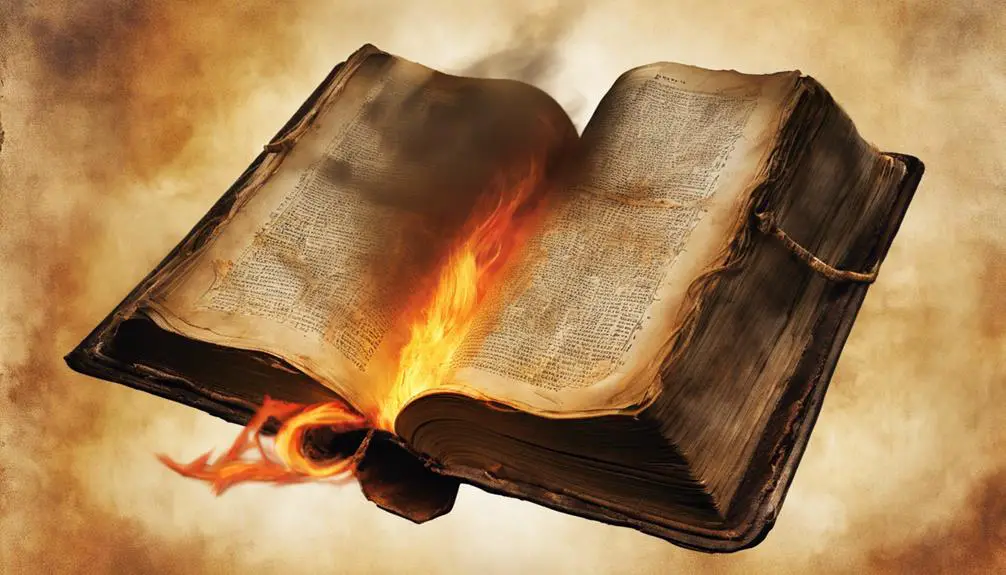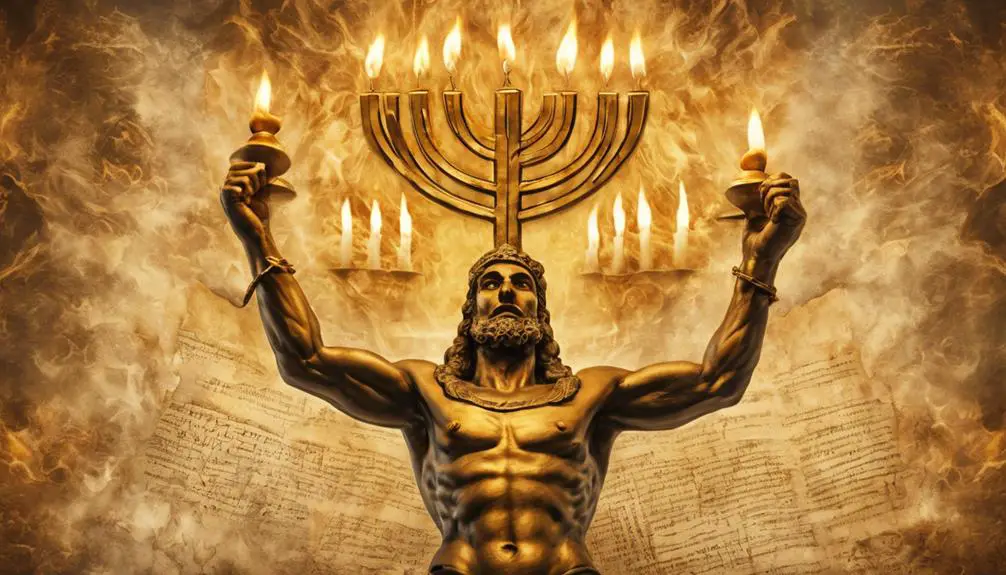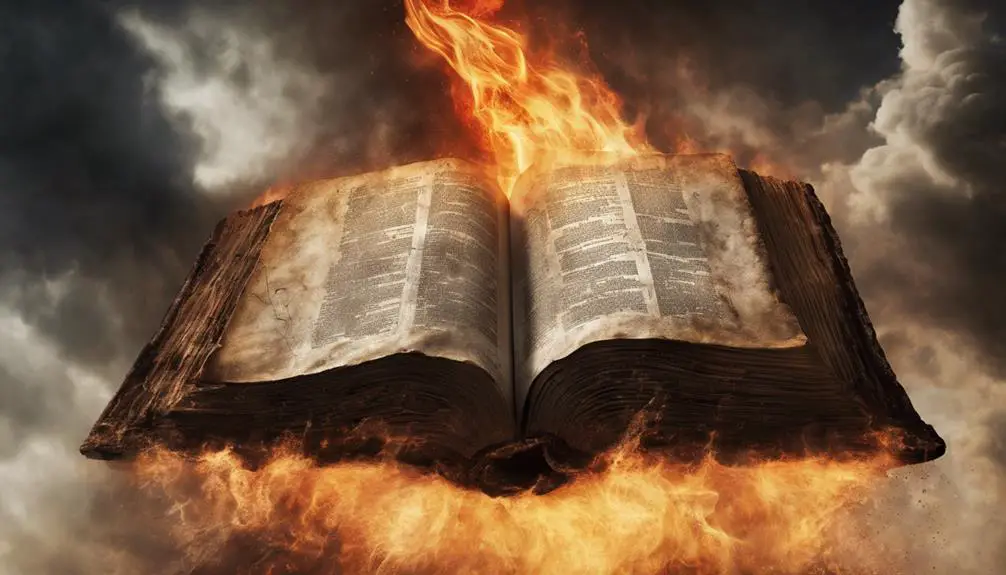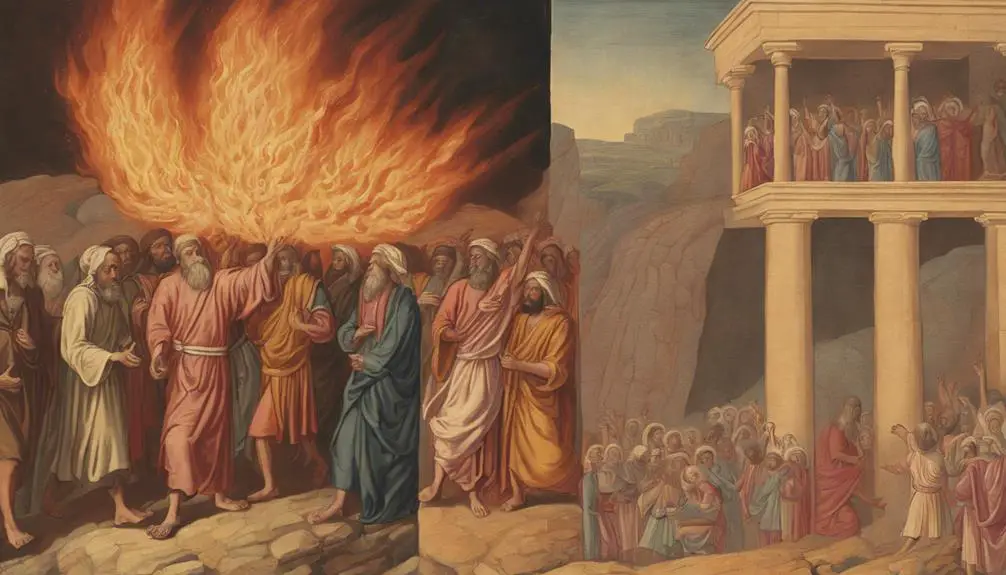Yearn to understand the symbolic significance of fire in the Bible? Dive into this intriguing study and unearth profound insights from the ancient text.

A Study of Fire in the Bible
Have you ever considered how often fire blazes across the pages of the Bible? It's a symbol that's hard to miss, serving as divine presence, a purifying force, a judgement tool, and even representing the Holy Spirit.
From Moses' burning bush to the tongues of fire at Pentecost, these fiery occurrences weave a compelling narrative. But what might we uncover if we stoke the embers of these stories, taking a closer look?
You'll be surprised at the depth of understanding you might gain into this ancient text.
Key Takeaways
- Fire in the Bible symbolizes divine presence, serving as a tangible connection between God and humanity.
- The Bible uses fire as a metaphor for purification, signifying the Holy Spirit's transformative work in believers' lives.
- Fire also represents divine judgment, indicating God's wrath and justice in situations like the destruction of Sodom and Gomorrah.
- Major biblical events, from Moses' burning bush to the tongues of fire at Pentecost, demonstrate divine power and guidance through fire.
Fire as Divine Presence

Delving into the concept of fire as Divine Presence, you'll find that it's a recurring motif in the Bible, symbolizing the tangible connection between God and humanity. Fire's visceral and dramatic nature serves as a potent medium for divine-human communication in biblical narratives. A striking instance is the burning bush witnessed by Moses in Exodus 3, where God's presence is signified by a bush that's aflame yet undamaged.
This image isn't just visually arresting; it's also heavy with theological implications. The fire's persistence without consuming the bush echoes God's enduring presence that doesn't drain or harm. It's a divine paradox that challenges our understanding of reality and invites deeper contemplation.
Similarly, in 1 Kings 18, fire from heaven validates Elijah's prophecy and demonstrates God's power and presence. Here, fire ignites faith and confirms divine authenticity.
Even in New Testament accounts, fire maintains its symbolic role as divine presence. The Holy Spirit's descent at Pentecost in Acts 2 is marked by 'tongues of fire', signifying God's empowering presence in believers' lives.
In these examples, you'll see fire's transformative effect and its role in revealing divine presence, offering a tangible link between God and humanity.
Fire Symbolizing Purification

Beyond its role as a symbol of divine presence, fire in the Bible also represents purification, a process in which impurities are removed to refine and sanctify. Fire's purifying quality can be seen in numerous biblical passages. You see, it's not just a destructive force, but also a transformative one.
In Numbers 31:23, we find an explicit reference to fire as a means of purification. In this verse, the Israelites are instructed to purify metal objects captured in war using fire. This illustrates a key belief that fire, in its intensity, has the power to burn away impurities and thus sanctify.
Similarly, in the New Testament, fire is used metaphorically to denote the purifying work of the Holy Spirit. In Matthew 3:11, John the Baptist declares that while he baptizes with water, the one coming after him will baptize with the Holy Spirit and fire. This suggests a baptism that isn't merely about cleansing, but about transformation and purification.
Through these examples, you can see how fire in the Bible is a symbol of purification, signifying a transformative process where what's impure is made pure, what's unholy is made holy.
Judgement Through Fire

Shifting our focus, let's examine how the Bible uses fire as a potent symbol of divine judgment. In this context, fire often signifies God's wrath and justice. It's not a gentle or purifying fire but a consuming, unquenchable one, marking a decisive and irreversible action.
Consider the story of Sodom and Gomorrah in Genesis 19, where God rained down 'burning sulfur' on the sinful cities, effectively erasing them from existence. Here, fire serves as an instrument of divine retribution, demonstrating God's absolute intolerance of sin.
In the New Testament, we see similar connotations. Matthew 13:40-42 mentions the 'furnace of fire,' where evildoers will be thrown at the end of age. This metaphorical fire signifies eternal separation from God – the ultimate form of divine judgment.
Yet, it's not only about punishment. The fire of judgment also reveals truth. In 1 Corinthians 3:13, each person's work will be made manifest, 'for the Day will disclose it, because it will be revealed by fire.' This fire tests the worthiness of our deeds, separating the valuable from the worthless.
Fire Representing the Holy Spirit

In the realm of biblical symbolism, fire also holds significant representation of the Holy Spirit, embodying attributes such as purification, illumination, and transformation. As you delve deeper into scripture, you'll notice the recurring theme of fire symbolizing these divine characteristics.
Consider the following table, which highlights some of these attributes and their corresponding biblical references:
Attribute |
Biblical Reference |
|---|---|
Purification |
Isaiah 6:6-7 |
Illumination |
Exodus 13:21 |
Transformation |
Acts 2:3-4 |
Consuming Power |
Hebrews 12:29 |
Divine Presence |
Exodus 3:2 |
These instances, without infringing on the territory of 'Notable Biblical Fire Events', clearly illustrate how fire stands as a symbol of the Holy Spirit's work in the lives of believers. It's a powerful metaphor, one that can illuminate your understanding of the Holy Spirit's role and impact. So, as you explore the Bible, keep an eye out for these fiery symbols. They're not just mere storytelling devices; they're spiritual signposts, guiding you to a deeper understanding of the divine.
Notable Biblical Fire Events

Delving into the annals of scripture, you'll encounter a plethora of notable events where fire plays a central, often transformative, role. One pivotal event you'll cross is Moses' encounter with the burning bush in Exodus 3. Here, God's presence is revealed through a bush that burns without being consumed, signifying His eternal and powerful nature.
Another instance worth noting is the pillar of fire in Exodus 13:21. This illuminating presence served as a guiding light, leading the Israelites during their desert sojourn, symbolizing God's guidance and protection.
In 1 Kings 18, you'll find the Prophet Elijah's contest on Mount Carmel. God's power is demonstrated when He sends down fire to consume Elijah's drenched offering, proving His superiority over Baal.
In the New Testament, you'll come across the tongues of fire in Acts 2. This fire represents the Holy Spirit bestowed upon the apostles during Pentecost, signaling the birth of the Christian Church.
These instances reveal the multifaceted roles of fire in the Bible, not just as a destructive force, but also as a symbol of divine power, guidance, and spiritual transformation.
Conclusion
You've journeyed through fire's multifaceted representation in the Bible. It's been seen as divine presence, a purifier, a symbol of judgement, and even an embodiment of the Holy Spirit.
You've dived into the depths of notable biblical fire events, shedding light on their profound significance.
Truly, fire's role in the Bible is as complex as it's enlightening, reminding us that even the most elemental aspects of our world hold profound spiritual meanings.



Sign up